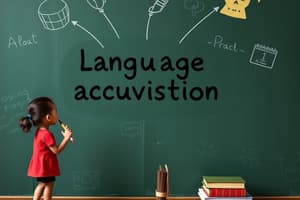Podcast
Questions and Answers
What do environmental theories of language acquisition emphasize?
What do environmental theories of language acquisition emphasize?
- Biological factors in language development
- The social interactions involved in language usage
- Learning both words and grammar (correct)
- An innate ability to understand language
According to nativist theories, what is believed about language acquisition?
According to nativist theories, what is believed about language acquisition?
- We have an innate ability to recognize and use grammar (correct)
- It is entirely influenced by environmental factors
- It evolves through reinforcement and conditioning
- It occurs only through social interactions
Who proposed that language is learned through operant conditioning?
Who proposed that language is learned through operant conditioning?
- Skinner (correct)
- Chomsky
- Vygotsky
- Piaget
What is a reinforcement in the context of Skinner's language acquisition theory?
What is a reinforcement in the context of Skinner's language acquisition theory?
Which theory emphasizes the importance of social interaction in language acquisition?
Which theory emphasizes the importance of social interaction in language acquisition?
What distinguishes environmental theories from nativist theories?
What distinguishes environmental theories from nativist theories?
In Skinner's view, how is language best understood?
In Skinner's view, how is language best understood?
What concept is closely related to Skinner's theory of language acquisition?
What concept is closely related to Skinner's theory of language acquisition?
What is another term commonly used for motherese?
What is another term commonly used for motherese?
Which of the following is NOT a characteristic of child-directed speech?
Which of the following is NOT a characteristic of child-directed speech?
What element is frequently used in child-directed speech to enhance understanding?
What element is frequently used in child-directed speech to enhance understanding?
How does child-directed speech typically change as children grow older?
How does child-directed speech typically change as children grow older?
What was the main finding of Werker et al. (1994) regarding infants' preferences?
What was the main finding of Werker et al. (1994) regarding infants' preferences?
Which of the following best describes the primary purpose of child-directed speech?
Which of the following best describes the primary purpose of child-directed speech?
What aspect of child-directed speech helps make phrases clearer?
What aspect of child-directed speech helps make phrases clearer?
In which of the following contexts does child-directed speech primarily appear?
In which of the following contexts does child-directed speech primarily appear?
Which of the following is a common feature of the vocabulary used in child-directed speech?
Which of the following is a common feature of the vocabulary used in child-directed speech?
Which statement about the presentation of child-directed speech is accurate?
Which statement about the presentation of child-directed speech is accurate?
What does Chomsky suggest about the learning theory's ability to explain language acquisition?
What does Chomsky suggest about the learning theory's ability to explain language acquisition?
Which aspect of language acquisition challenges the learning theory?
Which aspect of language acquisition challenges the learning theory?
What is indicated by children using overregularisation during language acquisition?
What is indicated by children using overregularisation during language acquisition?
What difficulty does the learning theory face according to the provided content?
What difficulty does the learning theory face according to the provided content?
How does adult speech influence children's grammar acquisition?
How does adult speech influence children's grammar acquisition?
What implication does the universality of language development have on learning theories?
What implication does the universality of language development have on learning theories?
Which statement reflects a criticism of imitation in language learning?
Which statement reflects a criticism of imitation in language learning?
Why might learning theory struggle to explain children's language acquisition?
Why might learning theory struggle to explain children's language acquisition?
What does the presence of fragments and poor grammar in adult speech imply about children's learning?
What does the presence of fragments and poor grammar in adult speech imply about children's learning?
What does Chomsky's perspective suggest about language development across cultures?
What does Chomsky's perspective suggest about language development across cultures?
What is meant by adult expansions in child-directed speech?
What is meant by adult expansions in child-directed speech?
How do children learn from negative input according to Saxton's contrast theory?
How do children learn from negative input according to Saxton's contrast theory?
What is a likely outcome when children master the basics of child-directed speech?
What is a likely outcome when children master the basics of child-directed speech?
What does Messer (2000) claim about child-directed speech?
What does Messer (2000) claim about child-directed speech?
What is the primary role of adult expansions in child language development?
What is the primary role of adult expansions in child language development?
Which example best illustrates Saxton’s theory of negative input?
Which example best illustrates Saxton’s theory of negative input?
What does the contrast theory of negative input focus on?
What does the contrast theory of negative input focus on?
Which of the following statements reflects common beliefs about child-directed speech?
Which of the following statements reflects common beliefs about child-directed speech?
Which of the following best describes the function of feedback in child-directed speech?
Which of the following best describes the function of feedback in child-directed speech?
What do social interactionist theories of language acquisition emphasize as the driving force behind language development?
What do social interactionist theories of language acquisition emphasize as the driving force behind language development?
How do social interactionists differ from nativists in their view of language acquisition?
How do social interactionists differ from nativists in their view of language acquisition?
What aspect of language learning is emphasized by Bruner's language acquisition socialization system (LASS)?
What aspect of language learning is emphasized by Bruner's language acquisition socialization system (LASS)?
What is the significance of 'turn-taking' in language interactions according to the content?
What is the significance of 'turn-taking' in language interactions according to the content?
According to social interactionist theories, what precedes the comprehension and production of language in infants?
According to social interactionist theories, what precedes the comprehension and production of language in infants?
What do social interactionist theorists believe about mere exposure to language?
What do social interactionist theorists believe about mere exposure to language?
What part of language do social interactionists focus on more than nativists?
What part of language do social interactionists focus on more than nativists?
Flashcards
Environmental theories of language acquisition
Environmental theories of language acquisition
These theories emphasize that learning words and grammar is a process of observation and reinforcement.
Learning theory (language)
Learning theory (language)
A psychological theory suggesting that language learning, like other behaviours, is acquired through reinforcement.
Skinner's theory of language
Skinner's theory of language
Behaviourist theory proposing that language is learned through operant or classical conditioning, emphasizing reinforcement.
Operant conditioning (language)
Operant conditioning (language)
Signup and view all the flashcards
Classical conditioning (language)
Classical conditioning (language)
Signup and view all the flashcards
Reinforcement (language)
Reinforcement (language)
Signup and view all the flashcards
Language as a learned behavior
Language as a learned behavior
Signup and view all the flashcards
Verbal Behavior
Verbal Behavior
Signup and view all the flashcards
Language Acquisition & Learning Theory
Language Acquisition & Learning Theory
Signup and view all the flashcards
Universal Language Development
Universal Language Development
Signup and view all the flashcards
Learning Theory Limitations
Learning Theory Limitations
Signup and view all the flashcards
Language Creativity
Language Creativity
Signup and view all the flashcards
Role of Imitation (language)
Role of Imitation (language)
Signup and view all the flashcards
Ungrammatical Speech
Ungrammatical Speech
Signup and view all the flashcards
Overregularization
Overregularization
Signup and view all the flashcards
Language Rule Application
Language Rule Application
Signup and view all the flashcards
Incomplete Sentences
Incomplete Sentences
Signup and view all the flashcards
Grammatical Errors
Grammatical Errors
Signup and view all the flashcards
Child-directed speech
Child-directed speech
Signup and view all the flashcards
Adult expansions
Adult expansions
Signup and view all the flashcards
Contrast Theory of Negative Input
Contrast Theory of Negative Input
Signup and view all the flashcards
How does adult expansion aid grammar?
How does adult expansion aid grammar?
Signup and view all the flashcards
What is the contrast theory?
What is the contrast theory?
Signup and view all the flashcards
Messer's Research on Child-Directed Speech
Messer's Research on Child-Directed Speech
Signup and view all the flashcards
How does the contrast theory link to adult expansions?
How does the contrast theory link to adult expansions?
Signup and view all the flashcards
What is the advantage of adult expansions?
What is the advantage of adult expansions?
Signup and view all the flashcards
Saxton's Examples of Adult Expansions
Saxton's Examples of Adult Expansions
Signup and view all the flashcards
How does immediate feedback impact language learning?
How does immediate feedback impact language learning?
Signup and view all the flashcards
Features of child-directed speech
Features of child-directed speech
Signup and view all the flashcards
Purpose of child-directed speech
Purpose of child-directed speech
Signup and view all the flashcards
How child-directed speech changes
How child-directed speech changes
Signup and view all the flashcards
Cultural universality of child-directed speech
Cultural universality of child-directed speech
Signup and view all the flashcards
Infants' preference for child-directed speech
Infants' preference for child-directed speech
Signup and view all the flashcards
Role of child-directed speech in language acquisition
Role of child-directed speech in language acquisition
Signup and view all the flashcards
Werker et al. (1994) study
Werker et al. (1994) study
Signup and view all the flashcards
Key concepts of child-directed speech
Key concepts of child-directed speech
Signup and view all the flashcards
Influence of child-directed speech on language development
Influence of child-directed speech on language development
Signup and view all the flashcards
Social Interactionist Theories
Social Interactionist Theories
Signup and view all the flashcards
LASS
LASS
Signup and view all the flashcards
Turn-Taking
Turn-Taking
Signup and view all the flashcards
Pragmatics of Language
Pragmatics of Language
Signup and view all the flashcards
Social Interaction vs. Nativism
Social Interaction vs. Nativism
Signup and view all the flashcards
Language is Not Abstract
Language is Not Abstract
Signup and view all the flashcards
Exposure to Language
Exposure to Language
Signup and view all the flashcards
Study Notes
Theories of Language Acquisition
- Language development is rapid, with children largely mastering complex language skills by ages 5 or 6.
- Theories of language acquisition fall into three categories: environmental, nativist, and social interactionist.
Environmental Theories
- Environmental theories emphasize the role of learning in acquiring both words and grammar.
- Behaviourist theory (Skinner, 1957) suggests language is learned through operant conditioning, reinforcement, and shaping.
- Attention, praise, and reinforcement strengthen language behaviours.
- Selective reinforcement and behaviour shaping mould simple language into complex language.
- Child-directed speech ("motherese") is a simplified form of speech used by adults to help children acquire language: it is slower, higher pitched, and uses short sentences and simple vocabulary.
Nativist Theories
- Nativist theories suggest an innate ability to acquire language.
- Chomsky (1957, 1959, 1965) proposed the Language Acquisition Device (LAD).
- The LAD enables children to identify the grammar of their language by recognizing linguistic universals.
- Children are able to generate novel sentences that they have never heard.
- Children use rules to generate correct grammar and apply rules despite incomplete or incorrect sentences they hear.
- The theory is criticised due to its disregard for the social and communicative aspects of language.
Social Interactionist Theories
- Social interactionist theories highlight the importance of communication and social interaction.
- Language is an active skill developed through interaction with others.
- Bruner (1983) described the Language Acquisition Socialization System (LASS), focusing on the social nature of language acquisition.
- Turn-taking, simplification of speech, and feedback during communication are important aspects impacting language learning and development.
- Language acquisition occurs in a social context.
Studying That Suits You
Use AI to generate personalized quizzes and flashcards to suit your learning preferences.




